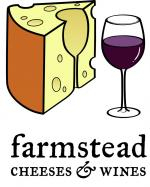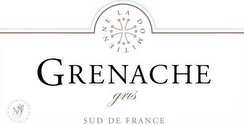Naia Verdejo – Sustainable, Vegan
TROSSET OLIM PRIORAT – organic and biodynamic
Jomain Aligoté
Stirm Calcite White Blend – Organic, Biodynamic & natural
La Domitienne Grenache Gris Rosé – organnic
Freelander Pinot Noir – sustainable
pANiGON médoc bORDEAUX – sustainable
Fond Croze Cairanne – organic
Jomain Bourgogne Blanc (Mostly Organic)
Domaine du Dragon Provence Rosé Grand Cuvée – Organic
Sean Thackrey Pleiades Old Vine California Red Table Wine – Sustainable
Mas de Gourgonnier Les Baux de Provence Rouge – Organic

Naia Verdejo – Sustainable, Vegan
Located on the left bank of the River Duero, the winery dedicates itself to the production of high quality white wines from their meticulously cared for vineyards, most of which were planted more than 40 years ago in the district of La Seca, one of the most highly renowned ‘cru’ of the region. Since the first vintage in 2004, Bodegas Naia has established itself as one of Rueda’s star producers
Sixty acres of vineyards: 50 of which are over 40 years of age. Bodegas Naia also works very closely with winegrowers from the region. These vineyards have an age range between 80 and 130 years.
Thought to have originated in North Africa, Verdejo has found a hospitable climate and soil in central Spain. Full-bodied and aromatic, this wine is often compared to Sauvignon Blanc.
The grapes are harvested at night to control the temperature and then fermented in 70% stainless steel, the rest in large French oak vats. This interesting combination of winemaking techniques result in a well-rounded and complex juice that is loved the world over.
Expect bright and fresh acidity with prevailing lemon, green apple, kiwi, and pear. This wine pairs really well with poached proteins and shellfish. The acidity cuts through and complements asparagus, tomatoes, olives, and greens with vinaigrette dressing.
90 points, Josh Raynolds, Vinous: Diaphanous gold. Aromas of ripe citrus and orchard fruits are complemented by suggestions of pungent flowers and fresh herbs. Silky and taut on the palate, offering bitter lemon pith, pear skin, and honeysuckle flavors that flesh out through the back half. Echoes the citrussy note on the long, chewy finish, which shows good tension and final grip.
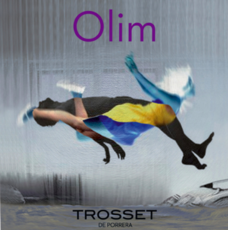 TROSSET OLIM PRIORAT – organic and biodynamic
TROSSET OLIM PRIORAT – organic and biodynamic
Trosset is a Catalan word meaning little piece, so this wine is a little piece of Porrera in Priorat. Brothers Diego and Eduardo Duran care for their tiny plot of organically farmed vines on a steeply sloped (60% incline!) vineyard on the famous llicorella soils of the region. They have over 100-year-old Carineña (Carignan) vines that grow scarcely taller than an outstretched hand, and produce less than a pound of concentrated, mineral fruit every fall. Diego terraces by hand to plant his Olim vineyard on a cool, windy, north-facing slope up the valley opposite Vall Llach.
Planted between 1000 and 1500 feet above sea level in soil poor in nutrients but abundant in dark slate, the vines are cuddled by the warmth trapped within the soil during the bitingly cold nights, nights are often 30-40°F colder than daytime temps, throughout the growing season. The resulting fruit is ripe and full of vibrancy.
The first thing that stands out about this wine is its remarkable freshness and liveliness, something that is atypical of Priorat. Spontaneously fermented and then aged for 12 months in neutral oak, the fruit is minimally altered allowing its true character to shine through. Notes of fresh black cherries and currants mingle with licorice and tobacco, out of the glass the palate is awash with fresh fruit that is bold yet structured leading to a wine that is well balanced. Drink now, or hold on to it to see where it goes, its journey is surely not finished.
Enjoy with lamb burgers, cured meats, or spicy sausages.

Jomain Aligoté – Lutte Raisonnée (following some organic practices)
A true family enterprise, brothers Philippe and Christophe Jomain, along with sister Catherine, launched this Chardonnay-focused Cote de Beaune domain in 1992 with vines inherited from their father, Marc. With precious parcels in four of Puligny’s premier crus and almost an acre of hallowed ground in the Grand Cru Batard Montrachet, Domaine Jomain consistently produces a line of classically elegant white Burgs.
The Jomains tend all their vineyards meticulously by hand with careful eco-sound practices, including bio-alternative vine and soil treatments in lieu of chemicals whenever possible. Harvest is of course also manual. From vineyard to the cellar, gentle handling of their Chardonnay fruit is of paramount importance.
In the cellar, Christophe takes every measure to ensure that the individual character of each terroir is fully expressed by avoiding manipulative technological tricks and excessive use of new oak. The Jomains do like the texture-enhancing effects of extended lees contact with batonnage, but never use more than 25% new barrels during the elevage of their wines.
The Jomain family are best known for creating superb Puligny-Montrachet. Puligny-Montrachet is one of Burgundy’s essential buys for Chardonnay lovers. The small appellation produces some of the world’s finest, purest expressions of the grape.
Aligoté is Burgundy’s “other” white grape, more rarely encountered than Chardonnay; yielding light, citrusy wines. It is also the traditional base ingredient for the Kir cocktail.
A brilliant white from Burgundy, and one of our favorite producers from Puligny Montrachet, the new Jomain Aligoté offers scintillating acidity, saline minerals, and lemony fruit on a full finish. Nice body and complexity for this off-the-beaten-path white variety that’s loved by the French as a companion to Chardonnay. Wonderful with rich cheeses and olives, or try with poached halibut or salmon with a beurre blanc sauce. We are one of the few shops in the country to have this wondrous bottling from Jomain!!

Stirm calcite – Organic, Biodynamic and Natural
Ryan Stirm is a true Riesling fanatic. His arguments for why Riesling works so well in California are hard to refute after tasting his wines. He started his winemaking career in the US, teaming up with the now legendary Justin Willett from Tyler and Lieu Dit. After four years, he ended up working in the Wachau, Austria where he fell further in love with Riesling as well as Grüner Veltliner.
His winemaking philosophy is quite simple: whole cluster press everything, allow for short periods of skin contact, avoid SO2 until fermentation has completed, let indigenous yeast do their jobs, and fine/filter as minimally as possible. The ultimate goal is to let the vineyards shine through.
This bottling, 88% Riesling from Wirz in Cienega Valley, 6% Chardonnay from Glenwood in the Santa Cruz Mtns, and 6% Scheurebe from C5 in Santa Ynez, is an easy-drinking, late summertime wine, perfect for hanging out on the porch, waiting for the sun to set. Dry, with notes of green apple and an intensely zippy minerality, with multitudes of white flowers on the nose.
The grapes were picked by hand over several passes between three different vineyards. At the winery, the grapes were given 24 hours of whole cluster maceration to extract tannins, aroma, and flavor compounds in the skins (Riesling/Scheurebe) and direct press (Chardonnay). No sulfur was added to allow the juice to oxidize. After a 36-hour cold settle in tank, the clean juice was racked off the solids to other barrels for spontaneous fermentation. The wine was sulfured post completion of secondary fermentation with elévage in barrel on fine lees. Racked off fine lees a month prior to bottling. Unfined and unfiltered. 32 ppm free sulfur at bottling, Bottled June 5th, 2021. 340 cases produced.
La Domitienne Grenache Gris – organic
The vineyards are the property of the Bonfils Family and occupy sections in the sub-areas of Minervois and Corbieères. The name La Domitienne is named after the ancient road, Via Domitian which divides the two growing zones, one in the North and the other in the South. The Via Domitia was the Roman road that allowed Roman soldiers to control all of Southern Gaul.
This Grenache Gris Rosé is from St Guilhem le Désert, a commune in the Hérault department in the Occitanie region in southern France. Situated in the narrow valley of the Gellone river where it meets the steep-sided gorge of the Hérault River, Saint-Guilhem-le-Désert is essentially a medieval village located on the Chemin de St-Jacques pilgrim route to Santiago de Compostella.
100% Grenache Gris from 25-year-old vines. After harvest, a 20 day ferment is steel, fermented with indigenous yeast, aged in stainless steel and cement tanks. Trace amounts of sulfur were added at bottling.
Pale, translucent pink. Intense tropical aromatics of papaya and dragon fruit. Bright fruity flavors of fresh papaya and ripe mandarin.

Freelander District One Pinot noir – sustainable
Vibrant ruby in color, delicious, and very accessible, this is a great example of California Pinot Noir’s hallmark ripeness.
Winemaker Larry Levin (formerly of Turnbull and Quintessa) selectively sources the fruit to capture that sun drenched richness without sacrificing balance.
Beautifully perfumed with aromas of crushed strawberries, dark cherry, hibiscus, fresh dill and damp earth. Concentrated on the palate, dark cherries, cola, strawberries and zippy hibiscus swirl about accented by slight oak influenced notes of dill and subtle vanilla.
The grapes were cold soaked for color extraction for about 4/5 days then pressed and fermented in stainless steel.AGINGThe wine was aged for 10 months in a combination of French and American oak with about 20% new.
Aged in French and American oak. It shows baked cherry and violet on the nose, crisp flavors of red currant, baking spice, and vivid strawberries balance the mouthfeel. A touch of toasted oak completes the gentle finish.
Freelander is sourced through select vineyards that produce elegant and impressive wines. Most of the fruit comes from small production vineyard blocks in California’s central valley. Our handcrafted wines are true to varietal, show complex fruit, and have a gentle, well-balanced finish.
Larry Levin is among the most experienced winemakers in the Napa Valley. After completing his Enology degree at UC Davis, Larry spent seventeen years at Dry Creek Vineyard where over 18 vintages he produced more than 15 varietal wines. He has since covered the globe by making wine in New Zealand, Chile, and Australia across all price points and styles. For the previous nine years Larry was head of winemaking at Icon Estates where he oversaw the Franciscan, Mt. Veeder, Robert Mondavi, Estancia, Ravenswood, Quintessa, and Ruffino brands. Larry also consults for wineries in the Stag’s Leap and Oakville districts in Napa and Sonoma.
90 points, Wine Enthusiast: “Crisp flavors of red currant, baking spice and vivid strawberries balance the mouthfeel. A touch of tasted oak completes the finish.
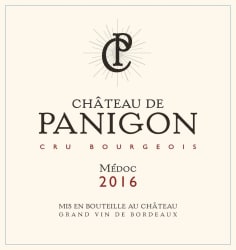 Chateau de Panigon Médoc – Sustainable
Chateau de Panigon Médoc – Sustainable
Chateau de Panigon benefits from one side of the Atlantic Ocean influences, the other of the presence of the Gironde estuary, providing favorable weather conditions for the development of grape varieties and a maturity of grapes. The vineyard grows on gravel mounds worthy of the best soils of the Medoc. Composed of 45% Cabernet Sauvignon, 50% Merlot and 5% Petit Verdot, the vineyard flourish hillocks on some of the best terroirs in the Medoc.
Château de Panigon is a beautiful estate of 200 acres located in the northern Médoc with about 60 acres planted to vines. Its history goes back to before the French Revolution and was mentioned back in 1850 in the first edition of Bordeaux and its Wines. In the next edition in 1868, Chateau de Panigon was classified as a Cru Bourgeois. So, there is some serious bonified history to the estate.
Situated in the village of Civrac – en – Médoc, about an hour from Bordeaux, the vineyard benefits from the oceanic influence of the nearby Atlantic Ocean as well as their proximity to the Gironde estuary, which together create an ideal climatic condition for the optimum development and maturity of the grapes. Composed of 45% Cabernet Sauvignon, 50% Merlot and 5% Petit Verdot, the vineyard flourishes on gravelly hillocks on some of the best terroirs in the Médoc.
Since 2006, the daughter and the son-in-law of the owners, Corinne Leveilley Dadda and Georges Dadda, have taken over the management of the Château, determined to produce red wines that seriously deliver. In 2016, Château de Panigon obtained the HVE – High Environmental Value- label, a guarantee of quality and respect for the environment.
Their estate vineyards are an average of 28 years old and are grown on an ideal blend of gravel and clay-limestone soils. Harvest is carried out parcel by parcel with manual and mechanical methods. The final wines are aged 100% in French oak (33% new barrels), for 12-18 months.
Château de Panigon seduces with its delicacy and a complex aromatic expression. The nose first displays notes of black fruits: blackberry, blackcurrant, then spreads the toasted notes. The palate is well balanced, long, and round. It reveals melted tannins and opens with a pleasant fruity finish.
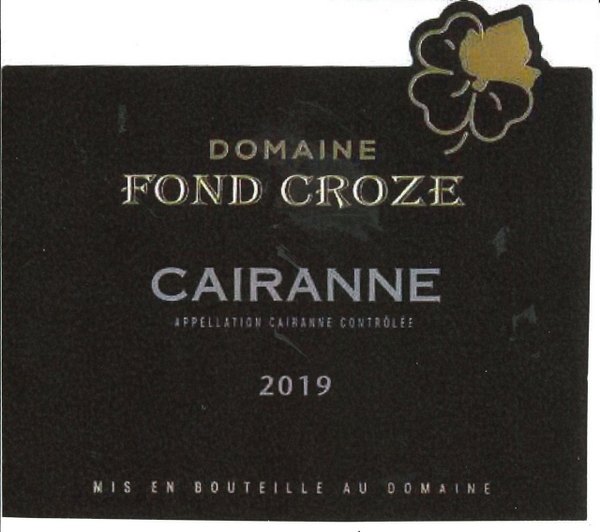 Fond croze cairanne – organic
Fond croze cairanne – organic
Cairanne is a village in the Côtes-du-Rhône appellation, one that due to its high wine quality, is allowed to put the name of the village on the label (like Gigondas, Lirac, Vacqueyras, etc.).
Domaine Fond Croze is located on the outskirts of the town of Cairanne, and this family-run business converted to organic viticulture in the nineties.
Founding patriarch Charles Long first purchased land outside Saint Roman de Malegarde after returning from World War I. His son, Raymond, expanded the vineyards once he started full-time in the business and today, Raymond’s sons Bruno (the winemaker) and Daniel (the vineyard manager) are the 3rd generation. Daniel’s son Guillaume continues the tradition, armed with a degree in enology and viticulture, and some impressive stints at wineries in the US.
The Longs produce a wide range of honest and unpretentious wines from their 200 acres of typical Rhône-ish varietals, distributed among six appellations: Cairanne, Rasteau, Côtes du Rhône Villages Vaison la Romaine, Côtes du Rhône Villages, Côtes du Rhône and I.G.P. Méditerranée, planted to nine different grapes, red and white.
60% Grenache Noir, 20% Carignan, and 20% Mourvèdre from old vines planted on clay-limestone soils on their five-acre estate hillside vineyard in Cairanne.
This wine has a deep garnet color with purplish hues. The first nose is complex and after slight aeration it releases aromas of stewed small black fruits and candied cherry. On the palate, we detect a nice acidity with well-present and structured tannins. This wine offers aromas of black fruits as well as toasted notes on the finish. Complex and well balanced, the finish is long.
90-93 points, Robert Parker’s Wine Advocate: Half Grenache, with the balance split equally between Carignan and Mourvèdre, the 2019 Cairanne is dark and impenetrable in the glass, giving up just brooding aromas of blackberries and dark-skinned plums. It’s full-bodied and tannic at this stage, but the tannins are ripe, adding plush layers of textural interest and lingering gently on the finish.

Jomain Bourgogne Blanc (Mostly Organic)
If you’re like me and love white Burgundy, you’ve been priced out of many of your favorites over the past years. That $30 Puligny-Montrachet is well now over $100, and the once bargain of St.Aubin is now in the $50-75 range.
A true family enterprise, brothers Philippe and Christophe Jomain, along with sister Catherine, launched this Chardonnay focused Cote de Beaune domaine in 1992 with vines inherited from their father, Marc. With precious parcels in four of Puligny’s premier crus and almost an acre of hallowed ground in the Grand Cru Batard Montrachet, Domaine Jomain consistently produces a line of classically elegant white Burgs.
The Jomains tend all their vineyards meticulously by hand with careful eco-sound practices, including bio-alternative vine and soil treatments in lieu of chemicals whenever possible. Harvest is of course also manual. From vineyard to the cellar, gentle handling of their Chardonnay fruit is of paramount importance.
In the cellar, Christophe takes every measure to ensure that the individual character of each terroir is fully expressed by avoiding manipulative technological tricks and excessive use of new oak. The Jomain do like the texture-enhancing effects of extended lees contact with batonnage, but never use more than 25% new barrels during the elevage of their wines.
The Jomain family are best known for creating superb Puligny-Montrachet, and this is your chance to taste their expertise at a much lower price.
This Bourgogne Blanc is produced in the same commune and offers a good level of interest for a reasonable price. Green gold in the glass, the aromas are spicy and buttery, with some white flowers, stone fruit, and citrus. Aged in steel and oak for a total of 12 months, This dry, white wine offers fruity aromas of lychee, pear, lemon, and apple while the hint of earthy mushroom adds complexity. Light, crisp, and clean, this is textbook Bourgogne.
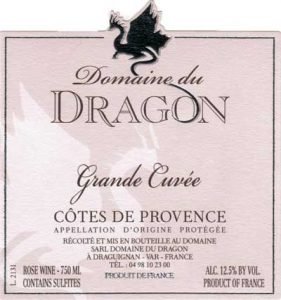 Domaine du Dragon Provence Rosé Grand Cuvée – Organic
Domaine du Dragon Provence Rosé Grand Cuvée – Organic
High up in the hills of southern France, above the Côte d’Azur and the crowds at Cannes, you’ll find the cool, terraced vineyards of Domaine du Dragon. The estate’s curiously chalky soils and high-altitude perch translate into wines both refined and complex, and that still offers exceptional value for their peerless quality.
While much of Provence is a patchwork of different terroirs, this corner near the town of Draguignan is unique in that it is nearly all limestone, more commonly found in places like Burgundy. Cooling winds whip through the forested valleys to moderate the southern sun, so grapes are not only perfectly ripe but also balanced.
Yet Provence would not be Provence without rosé, and it’s here where Dragon sets itself apart from the pack of tourist-pleasing (and often overpriced) pinks. The area’s chalky soul and cool character are expressed clearly in Dragon’s lively blend.
Many of Domaine du Dragon’s vineyard terraces were replanted in the 1990s (in addition to the estate’s cellars being modernized) to improve clonal selection, vine density, and the mix of grape varieties. Vines are cared for sustainably, following organic practices. Soils are rich in gravel and limestone, unusual terroir for the region.
A blend of Grenache, Mourvédre, Syrah and Cinsault. A heady, medium-bodied blend of southern red grapes, suitable for spicy foods as well as rich barbecue. Crafted as a rosé de pressurage (red grapes are pressed, extracting from the grapes’ skins a delicate blush color) with aromas of wild garrigue and summer berries.
Grapes are harvested by hand and fermented on indigenous yeasts in temperature-controlled, stainless steel tanks.
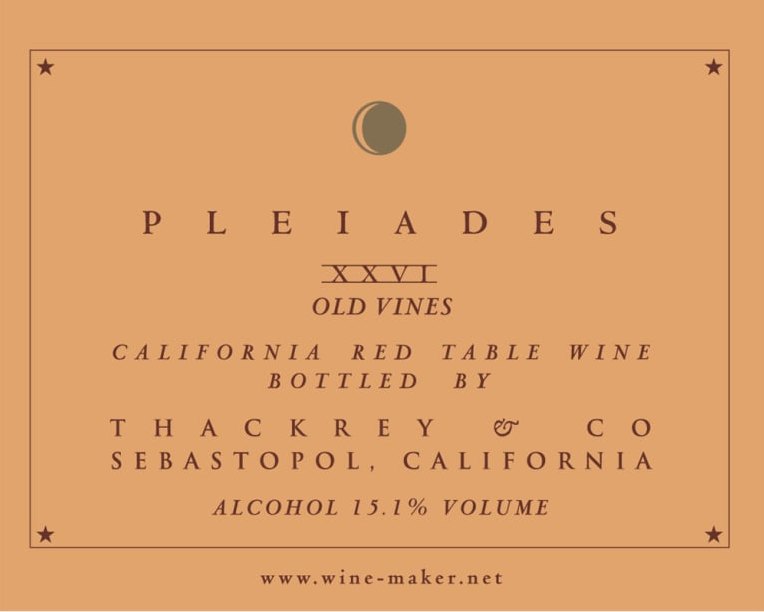 Sean Thackrey Pleiades Old Vines California Red Table Wine (Sustainable)
Sean Thackrey Pleiades Old Vines California Red Table Wine (Sustainable)
We’ve been selling Sean Thackrey‘s Pleiades – the first wine I ever remember calling a cult wine -since we opened in 2003. Back then, we got a teensy allocation, and we hid the wine behind the counter, doling it out bottle by bottle to a few lucky folks. Turns out, it was the stingy distributor who created a feeding frenzy, by doling out single cases tied to purchases of other, less desirable wines in their portfolio. Bad Juju all around, as there was always enough wine to be sold it turns out.
I was overjoyed when Sean switched distributors; and our allocations, while still not unfettered, granted us enough to offer the wine in our Classic Wine Club! This is the twelfth time that we’ve snagged enough for club members – and it’s a delight to be able to have enough to offer!
Sean passed away last month after a ten year struggle with cancer at age 79. Here’s a link to his obituary
Always a blend of many different grapes, both red and white, Pleiades is at the very least a very interesting wine, always easy to drink, and nearly impossible to describe.
Sean Thackrey lived in Bolinas and calls out Medieval, Roman and Renaissance texts as inspiration. He makes many of his wines in Bolinas as well, in open top fermenters located in a Eucalyptus grove. He has built a new facility in Sonoma county for the Pleiades line….
Here’s the back label text – same as it’s been since the first issue of this non-vintage wine: “the object of Pleiades Old Vines is to be delicious, delight the jaded, irritate the Wine Police, and generally go well with anything red wine goes well with.”
If there’s one California winery that’s farthest in spirit from the manicured order of the typical Napa estate, it’s Sean Thackrey‘s no-frills property in Bolinas. One hour’s drive north of San Francisco in western Marin County, and accessible only via a twisting road that ends at the Pacific’s edge, Bolinas exudes the mellow isolation of a hippie commune. That apparently works fine for the eccentric, cerebral Thackrey, who’s been making wine there for more than 20 years.
Wine Enthusiast: “It’s very difficult to rate this unusual bottling in a blind tasting. It’s a nonvintage dry red wine blended from mature years and has few if any peers in California. It’s very tasty because of traits that are usually considered flaws. A tawny color and an aroma like tawny Port lead to a very soft texture, and warm plum, raisin and nut flavors. The wine is rather full in body, light on tannins, and tastes quite mature and mellow.”

Mas de Gourgonnier Les Baux de Provence Rouge – Organic
When people talk seriously about “natural” wines, they often talk about the organic wines of Mas de Gourgonnier. In the heart of Provence in the 1970s, this family estate was one of the first officially certified organic wineries, back when such a practice was seen as foolish for vine growers trying to make a living.
Yet Mas de Gourgonnier’s organic roots go back even further. Since the eighteenth century, the Cartier family has worked these fields, providing the local abbey with freshly grown fruits, vegetables and grain. It was in the 1950s when the family planted its first vines.
The rest, as it is said, is history. Here in Mouriès, you’ll find a direct, unadulterated connection between the land and each bottle. The earthy aromas of flowering rosemary, wild sage and juniper and the mountain freshness of the cooling “mistral” winds are all echoed in the estate’s organically raised wines.
In this unassuming, rugged appellation, the integrity and consistency of the family’s philosophy and products mirrored our own as an importer. This is a vine-growing family that doesn’t have to “sell” a natural philosophy; it’s simply who they are, and who they’ve always been. This purity of focus and flavor is still true today. Mas de Gourgonnier is one of the bedrock estates in southern France and certainly one that has few peers.
The vineyards of Mas de Gourgonnier make up a mini-paradise just south of the granite Alpilles Mountains. The estate is certified organic (Ecocert) and has been since 1975; in fact, it was one of the first in the region. Soils are a mix of decomposed granite and limestone, very rocky and dry. Vineyards are surrounded by pine trees and the natural scrub (garrigue) of the south, perfuming the area with rosemary, thyme and lavender. The estate makes its own compost (from cow/sheep manure) and plows between vineyard rows; beneficial herbs are planted to control pests and moderate vine growth.
Grapes are harvested by hand in the early morning hours or late in the evening when temperatures are cooler, and are fermented on indigenous yeasts in temperature-controlled tanks. Very little to no sulfur is added during the fermentation process. Wines are aged in tank for the white and rosé; and in a combination of tank, large oak barrel and older French oak barrels for the reds. All wines are bottled unfined and unfiltered.
Les Baux de Provence Rouge A richly flavored red (44% Syrah, 26% Grenache, 15% Cabernet Sauvignon, 15% Carignan) with autumnal aromas, plush red/black fruits and peppery spice. Few other Provençal reds can match the power and grace of this bottle (its form a traditional Normandy “Calvados” shape that only Gourgonnier uses).
Hand-harvested. Grapes are destemmed and lightly crushed, and fermented on indigenous yeasts in temperature-controlled, stainless steel tanks. Aged in a combination of tank and older French barrels. Bottled unfined and unfiltered.
Aromas of Provençal garrigue; flavors of spiced cherries, plums, ginger and dark chocolate.

